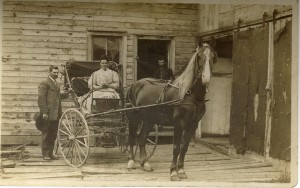 January 12, 2010
January 12, 2010
The woman on the horse is a relative that I share a first name with…tho, of course, I never knew her. I wonder what else we might share. Hair color, height, health?
The U.S. Surgeon General advises us to ‘know our family health history.’ The problem is, what to know and how to know it. Since 2004, the Surgeon General has declared Thanksgiving to be National Family History Day [http://www.hhs.gov/familyhistory/] as part of an initiative to get us talking. While we do need to find a time to talk with our family about our health histories, few things seem more doomed to failure than pushing families to talk about poor health at a gathering aimed at celebrating.
First, older adults in our families have many interesting things to tell us about that go on in their lives besides poor health. Many have good health and no reason to focus on poor health. Many want to avoid the stereotype linked to old folks talking about their health and nothing else…even when they do have poor health.
Second, younger adults who need to know about their family health history need to know details that are unlikely to be discussed in such public settings, or if they are discussed, unlikely to be remembered.
Third, it is not particularly helpful to know that there is diabetes or heart disease or cancer in your family if you don’t also know who had the condition, at what age they had the condition, what treatment they used to address the condition, and with what success. Or, knowing what family members have died from should be accompanied by information about the age at time of death.
In this era when we have more awareness of how genes affect health and our reponses to medications and other therapies, we may want to know whether our family members have had any genetic tests. If they have, what ones led to positive results indicating the presence of a particular form of a gene?
Talking about family health history is important but can be difficult if we don’t make time and don’t know what to talk about….

 January 3, 2010
January 3, 2010 January 2, 2010
January 2, 2010 January 1, 2010
January 1, 2010